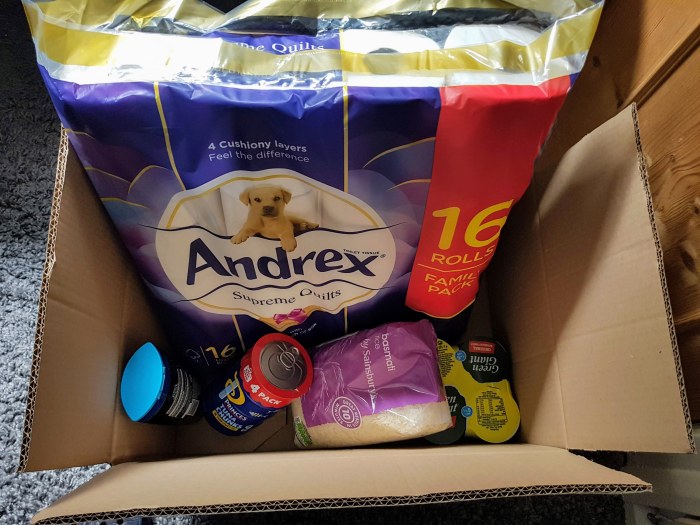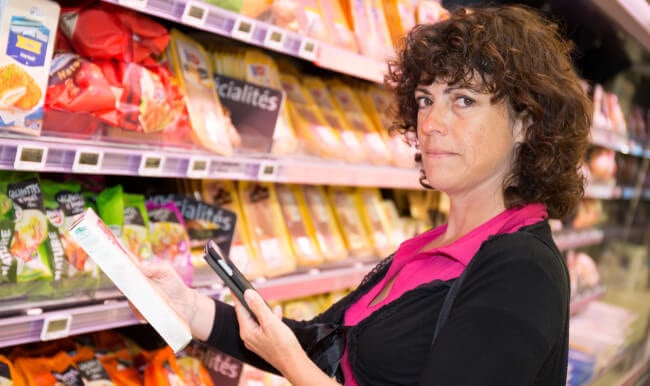On the days following Brexit, you might see empty supermarket shelves. Here’s how to stockpile correctly – and without wasting your money
Brexit is such a controversial topic, it’s sometimes easy to forget the possible everyday ramifications – and in particular, products that might disappear from our shops for a while, following a ‘hard’ Brexit.
At this point, it’s hard to tell whether we’ll actually leave the EU without a deal on October 31, 2019 – but if we do, it might be a good idea to be prepared. However, there’s no reason to spend a ton of money while you’re doing it… (In fact, saving more money is another thing you should be doing ahead of a No-Deal Brexit).
According to a recent research quoted in The Guardian, “one in five people are already hoarding food, drinks and medicine, spending an extra £380 each”. And unfortunately, 800,000 people have spent more than… £1,000 on stockpiling.
In my household, we already have a Brexit Box, with some food and products we’re stockpiling ahead of October 31 – just to be on the safe side, I guess. So in this post, I’ll give you tips on the things you should have in YOUR Brexit Box, and importantly, how and where to buy some of those things without breaking the bank.
Do I Need To Stockpile For Brexit?
I can’t give you a definite answer to this question. However, a leaked government document predicts a possible shortage of food, petrol and medicine – in case of a hard Brexit – so who am I to argue with that?

UK supermarkets have limited storage space, as they usually sell “fresh” products. Think back to days of extreme weather and snow. How quickly did some shelves at your nearby Tesco got empty? And sometimes, the shelves STAY empty for days after the snow, as the supermarkets struggle to bring in fresh products fast enough.
The same thing sometimes happens around holidays, as big crowds buy fresh produce in advance, and shortages are created.
Well, now go back to thinking about a hard Brexit:
1. People who didn’t stockpile in advance will storm the shops in the days before Brexit, and shortages will be created merely by the amount of shopping people will do.
2. In case of a No Deal Brexit – and EVEN in case there IS a deal – there’s likely to be some chaos on the days following the actual exit. Stuff from the EU will either not get through at all, or will trickle in very slowly, thus creating more shortages.
3. What about stuff that is manufactured in the UK? It’ll suffer from a ripple effect – if you can’t find your favourite cheese from the EU, you’ll be forced to buy the UK cheese you never bought before. Now multiply that by the millions… and that’s how products manufactured in the UK will also disappear quickly.
And remember, we’re not talking just about food – the same goes for cleaning products, toilet rolls and even medicine.
Oh, and even if you DO manage to find products on the shelves – there’s a good chance prices will go up considerably. Do you want to buy a single toilet roll for £3?
Tips For Better Brexit Stockpiling
As we’ve seen before, Brexit dates come and go. They might postpone it again, or maybe there’ll be a deal and nothing bad will happen… but because it’s so hard to tell, it’s important to do your stockpiling correctly – in a way that doesn’t get you into financial trouble, and doesn’t leave you out of pocket in case everything’s cancelled.

So here are a few general tips:
- Start Early! Don’t wait until the very last moment. By then, supermarkets might have shortages, prices might hike, and you won’t have time to compare prices. In addition, by starting early you can spread the cost, and not have a single big supermarket spend a week before Brexit-Day.
- Compare Prices: See, that’s why it’s important to start early. Stockpiling is the perfect time to use coupons, cashback apps (like Shopmium), etc’.
- Check Use-By Dates: There’s no point in hiding some food in the attic, only to find out come-Brexit that it expired a month ago. Plus, if nothing happens on October 31, you would want to move everything to your “regular” kitchen, and so make sure you have enough time to consume it.
- Hide The Brexit-Box: Not from your neighbours, but from yourself. If your Brexit-items are staring at you in the kitchen, you might be tempted to eat them on a cold night. Put everything in a big box, and “hide” that box somewhere in the house.
- Don’t Forget Your Favourite Brands: Stockpiling isn’t really the time to be too picky when it comes to brands – but if there’s a certain food brand that you swear by, and won’t be willing to replace it – make sure you stock enough of it ahead. Especially if it’s manufactured in the EU.
- Don’t Buy Things You Don’t Normally Use/Eat – Hate baked beans? (Blasphemy!) Then there’s really no reason to buy 20 cans of it. You’re NOT going to start liking them come Brexit-Day… so only stockpile on things you normally use – and WOULD use in case they’re not even needed.
- Don’t Stockpile Fresh Produce And Things That Need Refrigeration – If there are things you MUST have, like soft cheese, try to buy it a week before Brexit-Day (hoping it won’t be too late by then).
- Don’t Overdo It! Listen, the country isn’t coming to an end. Capitalism is going to win, eventually. So please don’t fill an entire room in your house with food and toilet rolls – think about the necessities and things you would definitely need for a few weeks – a month, tops. And remember, supermarkets aren’t going to be EMPTY, so it’s not like you’ll need to survive on your stockpiling alone.
Things To Stockpile – And Where To Buy Them Cheaply
Obviously, this list will change from person to person – your likes and needs are different than mine. But use this list of necessities as a baseline:
Medication
If you have chronic conditions that require ongoing medication, you might want to consult with your GP.
The NHS doesn’t want you to hoard medication, and for good reason – but you should still be sensible about it. Try to make sure you have at least 2-3 months-worth of your regular medication ahead of Brexit-Day.
Plus, it’s a good idea to stock up on some over-the-counter basic medicine like Paracetamol, anti-allergy pills, Vitamin D, etc’.
Also, don’t forget a first-aid kit… you know, just in case.
Where To Buy: Some popular over-the-counter medication can be bought VERY cheaply in discount supermarkets like Lidl and Aldi – and even pound shops.
Canned Food
When it comes to stockpiling food, canned food is your friend. These tins usually have a Use-By date of at least several months ahead, and usually even years – just make sure you check before you buy.
So things like Tuna (Never pay more than £3.5 for a 4-pack!), Beans, Corn, Canned Meat, Chopped Tomatoes and even Tinned Soup. Oh, and make sure you have a can opener!
Where To Buy: As always, the discount supermarkets should be your first port of call – though the big chains (like Tesco and Sainsbury’s) sometimes have good deals on these as well. Pound shops also usually have a small selection of cheap canned food.

Rice
Another food item that usually lasts for a couple of years (at least), isn’t hard to store and is a good food source. (Think supermarkets won’t run out of rice? My nearby Sainsbury’s runs out of rice 3-4 times a year, for inexplicable (to me) reasons.)
Where To Buy: Lidl/Aldi or your local supermarket’s own brand.
Long Life Milk/Alternatives
UHT Milk can be kept (unopened) for several months, so it’s a good candidate for your Brexit Box. You can also find long-life alternatives like Coconut milk and Almond milk.
Where To Buy: Lidl/Aldi, or on sale at your local supermarket.
Dry Foods
Things like Pasta, Cereal, Crispbread – things that last for a few months (at least). Flour is also a good idea, if you know what to do with it, as well as cooking oil.
Hard cheese that doesn’t require refrigeration also goes in here – you won’t often find these types of cheese at your local supermarket, you might have to go to a speciality store for that.
Where To Buy: Lidl/Aldi, or on sale at your local supermarket.
Free-From Products
That’s a tricky one, as many of the Gluten-Free products come from the EU, as well as many of the Lactose-Free products. And while it’s easy to stockpile on things like Gluten Free crispbread or pasta, it won’t be easy to stockpile on gluten-free bread, Lactose-free soft cheese, coconut-based cheese, etc’.
My recommendation would be to freeze what you can – gluten-free bread, for example. And find cheeses that have a shelf-life of a few months, and stockpile on those. Other than that – go for the dry stuff (We already have several Gluten-Free crispbread boxes in our BrexitBox.)
Where To Buy: Free-from products are never cheap, and unfortunately, the discount stores like Lidl/Aldi and the pound shops carry a very small selection (if any). That’s why it’s important to start stockpiling early – so you’ll have time to find special deals at the big supermarkets, and use those to add to your BrexitBox.
Tea and Coffee
Sure, most of the tea we drink is manufactured in the UK – but not all of it, and you don’t know what scared tea-loving people are going to do a week before BrexitDay. So if you love your tea, or a special brand of coffee – prepare in advance.
Where To Buy: Lidl/Aldi, or on sale at your local supermarket.
Toilet Rolls
As weird as it might sound, toilet rolls disappear quickly from the shelves when times are bad. Make sure you have a big enough pack in your Brexit-Box…
Where To Buy: Either at the discount stores like Aldi/Lidl, or – even better- find deals on big packs on sites like Groupon and Amazon.
Toiletries And Cleaning Supplies
Things like handwash, toothpaste, shaving supplies, washing up liquid, laundry liquid, etc’. Again, many of these come from the EU, and might disappear on Brexit-Day.
Where To Buy: The discount supermarkets (Lidl/Aldi), or cheap pharm chains like Savers.
Pet Food
That’s an important one – many of the pet food brands (especially some of the high-end ones) are manufactured in Germany, and shortages are inevitable in case of a No-Deal Brexit.
It’s even more crucial if your pet has special dietary needs – our cat, for example, is allergic to both chicken and fish, so he has to get special food from Germany. Make sure you stockpile ahead for at least a month!
Where To Buy: I have a full guide on where to buy cheap pet food.
And this is it… Again, this list will look different for you and your needs – but you get the general idea.
If we’re lucky, come November 1 we’ll just open our BrexitBox and put everything back in the kitchen… but better safe than sorry.

Hi or thanks info extremely helpful. Thank you 😊
I have started stockpiling, not for Brexit though, I buy stock up on offers to save me money in the long run.